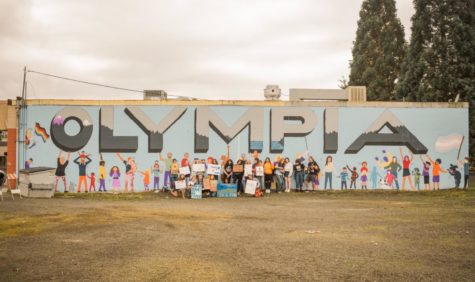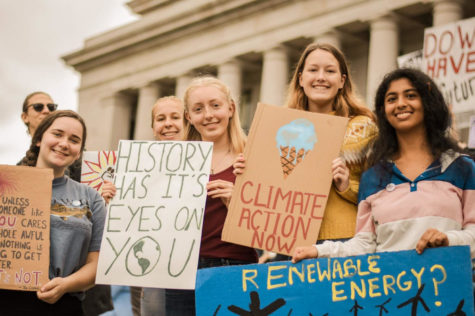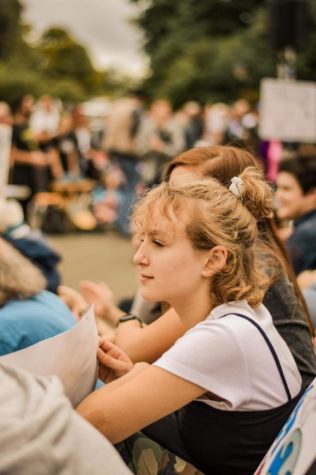CHS Students Take on September Climate Strike
December 6, 2019
Weeks after she climbed the steps of the Capitol Building, Brisa Sabel said she was excited to be part of such a worldwide event.
On Friday, September 20, 2019, students from all over the world left school to rally for climate action. In Olympia, CHS students were encouraged by classmates and friends to join Olympia’s Climate Strike, where students would gather at the Capitol steps to demand government addressment regarding climate change. Sabel, co-President of the Capital Climate Club, was one of the students encouraging others to go.
“It was incredible seeing how many people cared about the climate crisis.” Sabel said. “It’s easy to feel alone because the problem is so huge, but when you see how many people care about it, it’s pretty great.”
The Capital Climate Club is a new addition to this year’s set of extracurricular and Coug Time activities, and Sabel said she was inspired to create it after she attended a climate rally this summer. Approached by climate activist students from Olympia High School, Sabel said they asked her what school she attended, and when she said Capital, they suggested she create a sister club.
Although Sabel was responsible for encouraging Capital students to attend the Strike, she said there was a wide demographic: preschoolers, retired veterans, climate action organizations, and a pre-registration voting stand targeting high school students all made an appearance at the Capitol.
Paloma Sharangpani, who is a Public Relations Officer of the Climate Club, said her favorite part of the Strike was when one speech proved the effectiveness of activism.
“One girl talked about activism and how some people didn’t think it had much effect.” Sharangpani said. “Then, she went back through all of the movements, like Womens’ Suffrage and Civil Rights, and went through the impact that protesting had, especially among young people.”
Although Sharangpani said the outcome of the Strike was larger than she expected, the school day still continued, and assignments and tests kept some Capital students from leaving to advocate. With unexcused absences given to students who decided to leave, students had to stay at school if they didn’t want the situation to escalate.
According to the Olympia School District’s unexcused absence policy, a student’s unexcused absence can be excused by a parent or guardian. However, Shasta Hecht said that even after her mother tried to excuse her from school so she could go to the Strike, the school would not excuse the absence.
“They said, “I’m sorry, we cannot excuse your child.” Hecht said. “They refused to, and [my mom] thought it was absolutely ridiculous. They didn’t let me go even though my mom excused me, simply because it was a Climate Strike.”
Sharangpani agreed with Hecht’s mother, saying the unexcused absence policy was “ridiculous” and “disappointing”, especially since other school districts, like New York City, decided to release their 1.1 million students from school so they could advocate for climate action.
“I get that a couple of people would go [to the Climate Strike] because they didn’t want to go to class, but the majority of the people went because they actually care about the climate and want to make a change, be an activist, and do more important things with their lives- things that are more important than school.” Sharangpani said.
Student athletes were also discouraged from going to the Strike due to the knowledge that if they miss school the day of or before a game or meet, they will not be allowed to participate in their sport.
“It definitely did discourage people from going who otherwise would have gone.” Sabel said.
Dora Hamilton, who attended the Strike, said the guidelines regarding unexcused absences were up for the students’ interpretation.
“The night before the Strike, they sent out an email linking the Capital guidelines for excused and unexcused absences,” Hamilton said, “and under the “Excused” guidelines, a reason for an excuse was a “cultural event”. That was my interpretation of the Strike.”
Hamilton said the school’s email never clarified whether or not the Strike would result in an unexcused absence.
However, even with unexcused absences, Sabel, Sharangpani, and Hamilton all said the Strike was an incredible experience. To Sabel, climate action is the most important issue there is.
“Be educated.” Sabel said. “Everyone should support [climate action] because it’s an issue that affects everyone.”

Source: Jordie Simpson, @laylalens

Source: Jordie Simpson, @laylalens

Source: Jordie Simpson, @laylalens
